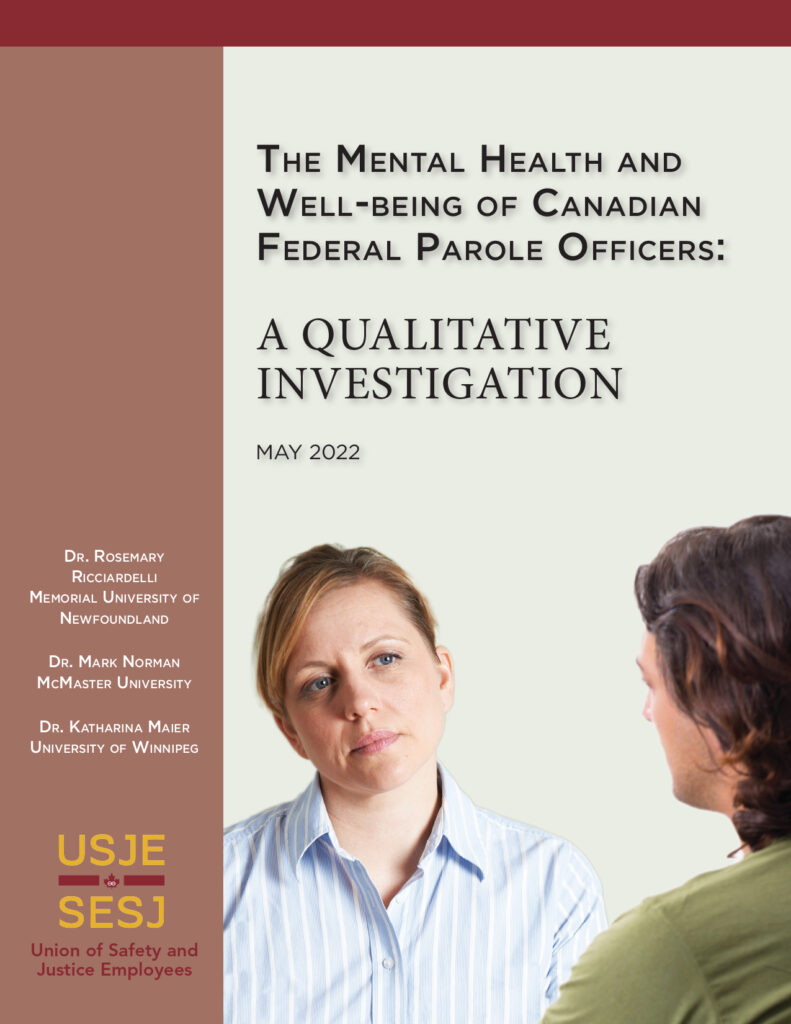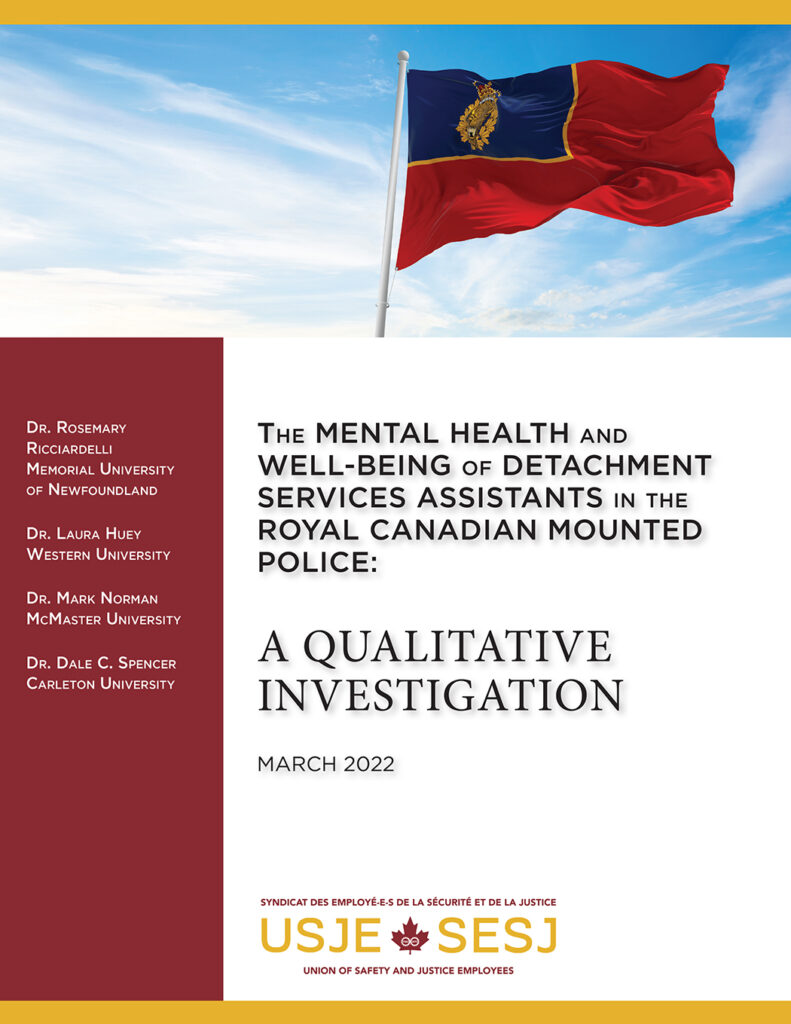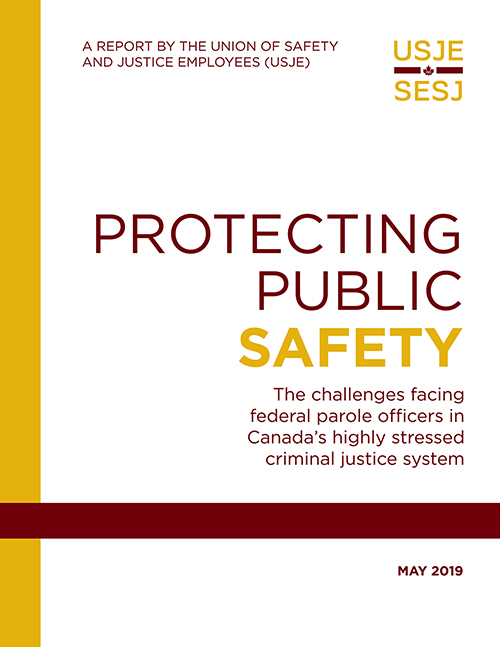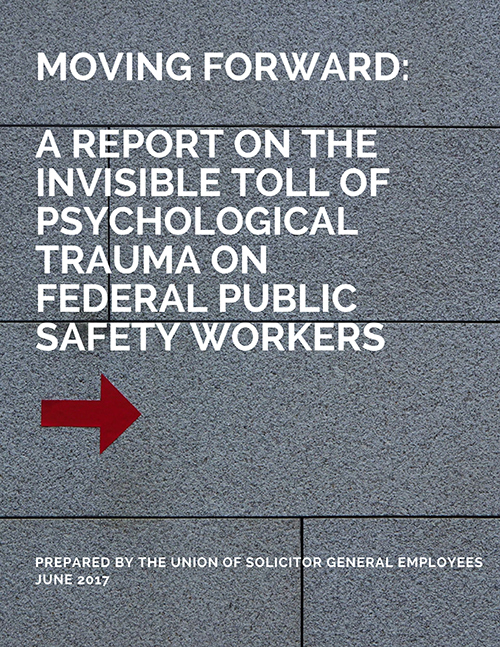Reports

USJE Responds to the Report of the Mass Casualty Commission
This overview of the findings of the final report of the Mass Casualty Commission published in March 2023 is particularly concerned with the perception of the importance of the role played by USJE members during the tragedy in Portapique in 2020.

The Mental Health and Well-being of Canadian Federal Parole Officers: A Qualitative Investigation
In this report, we present findings based on interviews with 150 Parole Officers employed by Correctional Service Canada. Specifically, we focus on five core themes that emerged as salient across interviewees’ narratives:
a) Workload and job tasks
b) Job satisfaction
c) Organizational climate and culture
d) Health and well-being
e) Impacts of the COVID-19 pandemic
We conclude the report with a set of recommendations that aim to address Parole Officers’ accounts of organizational stressors and challenges; improve health and well-being; enhance job satisfaction; and build a parole system well equipped for dealing with future public health crises.

The Mental Health and Well-being of Detachment Services Assistants in The Royal Canadian Mounted Police: A Qualitative Investigation
This report addresses the experiences of Royal Canadian Mounted Police (RCMP) Detachment Services Assistants (DSAs), largely working in rural and remote areas, specifically examining their unique occupational stresses and their exposure to potentially psychologically traumatic events (PPTE) in their work. Drawing on 49 semi-structured interviews with DSAs, this report elucidates their understandings of occupational stress and PPTE, their mental health and well-being needs, and their access to and experiences utilizing mental health resources.

DRAFT REPORT: USJE CONSULTATION ON PAROLE OFFICER WORKLOAD AND RESOURCE TOOLS
In June of 2021, the Union of Safety and Justice Employees (USJE) convened five roundtables with Parole Officers in Institutions and Communities across the country. The purpose of these roundtables was to canvass some of CSC’s most crucial frontline employees on: 1. how the pandemic and other changes within Corrections has created workload challenges in managing Canada’s federal offender population; 2. solicit their views on the efficacy of current resourcing tools within Corrections, and 3. identify solutions to improve and expand tools and resources where appropriate.

PROTECTING PUBLIC SAFETY: THE CHALLENGES FACING FEDERAL PAROLE OFFICERS IN CANADA’S HIGHLY STRESSED CRIMINAL JUSTICE SYSTEM
This report, released in May of 2019, says Canada’s correctional system is stressed and nearing a breaking point – with a majority of respondents asserting their working conditions often prevent them from properly assessing, supervising and preparing offenders for their safe return to society.
High offender caseloads, chronic understaffing, and significant changes to correctional programs and services in federal institutions and communities are cited as presenting insurmountable challenges to managing offender risk.
More than two-thirds (69%) of parole officers surveyed worried they are not able to sufficiently protect the public given their current workloads. The vast majority (92%) agreed an increase in staffing would improve their capacity to keep Canadians safe.
A further 85% agreed a decrease in the number of offenders assigned to them would improve public safety.

MOVING FORWARD: A REPORT ON THE INVISIBLE TOLL OF PSYCHOLOGICAL TRAUMA ON FEDERAL PUBLIC SAFETY WORKERS
This report, released in June of 2017, calls for federal measures to protect and recognize public safety and justice workers who are at significant risk of suffering psychological injuries from exposure to second-hand trauma at work.
Based on a national survey, the report shows that a majority of public safety employees who responded are negatively affected by the violent nature of criminal histories, victim statements, graphic evidence, and related materials they manage in high stress work environments. These include parole officers, teachers and others working in federal prisons, and employees in RCMP detachments, federal courts and the Parole Board of Canada.
